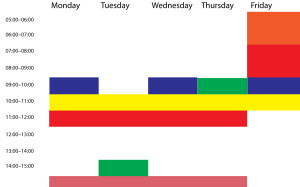I have the very best time talking with people, leading a writing session, meeting folk, yapping away. The very best time. But I get nervous beforehand. Seriously nervous.
I've only vomited once but it's been close a fair few times. And every time, every time, every time, I am so nervous that my body chemistry alters. I think my mind chemistry takes a beating too because you probably wouldn't like me as a big event gets closer. It's not that I'm mean suddenly, but you'll quickly conclude that life is too short, whatever you want can wait until I've returned to planet Earth.
That all goes the second I begin talking. The instant I step on stage. The instant. I have this very clear visual image of many, many times when I've looked at the microphone, taken a breath – and boom, I'm off. I truly cannot overempathise how exciting it is to meet people and bring them something I know they'll enjoy. I can say that last bit with huge ease because I'm sure I've stolen everything from cleverer people.
But I'll do confession another time, we're here to talk about nerves. Since I talked at LitFest Birmingham, a literature festival in Birmingham, back in September 2012, I've counted the talks I've done. Talks, workshops, writing sessions, radio interviews, television, anything. I'm not sure why but I note the date, the event and the number of people present. If I had any brains at all I would also jot down what I spoke about so that I don't repeat myself, but I haven't so I don't so I might.
Last night I did my 42nd since then – so that's what, two or three events every month. That's not a fair estimate as it's all trending upwards, but typically I've always got something on the horizon and so I always have nerves.
If you take nothing away from me today, make sure it isn't this: the only way I cope with nerves before a big event is to have a bigger event scheduled before it.
That's not my biggest mistake, though. My big one and the thing I would actually like you to take away or perhaps argue with me about, is that nerves have no connection to the quality of the event or of the work you do.
I came to believe they did. I've always believed that if you're blasé about a talk, you shouldn't be doing it. But I came to find that the opposite was the terribly seductive idea that the more nervous you are, the better you'll be on the night. It's this business of the instant transformation when I reach the stage. That change feels the bigger when you've vomiting in the car park.
But.
I've done 42 talks. Nervous before all 42. I'd say that roughly 20 went brilliantly and I know that means 21 went merely superbly. Because I know that I died on exactly 1.
I deserved to, I was crap. But it wasn't because I was less nervous. It was because I wasn't well enough prepared. (I need to tell you that it wasn't for want of trying. I spent a lot of time on that gig and it was just somehow eluding me, I didn't nail the material until the morning of the event and I was wrong to think I'd manage to master it in time.)
You can't really base any science or true statistics on one person's 42 experiences. But you can try. And concluding that nerves have no connection at all to whether or not one succeeds, if concluding that success is entirely dependent upon your material, that's ultimately better for your stomach, for your audience and for the poor people who had to clean up the car park.
Incidentally, if you dare, I am available to talk about writing, technology and productivity. Just don't ask me to talk about nerves because that would be just far too meta for me.
http://feedproxy.google.com/~r/The99Percent/~3/L8x1MY7Fu_8/feeling-anxious-dont-try-to-calm-down-get-excited

